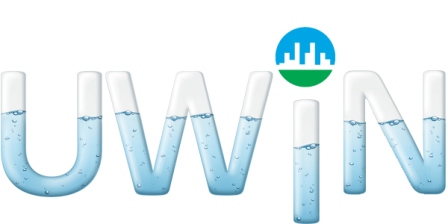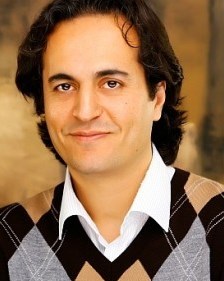D1-2: Cross-site comparisons and contrasts across UWIN ecohydrologic regions
Mazdak Arabi, PhD
Colorado State University
Civil & Environmental Engineering
The overall goal of this project is to assess tradeoffs associated with sustainable urban water solutions under climatic, land use, population, economic development, planning, and policy uncertainty. We will first develop a reference case scenario for 2015 – 2100 for each of the regions, based on a comparable assumption of “business as usual”. As part of this developm ent, we will also formulate a suite of sustainability indicators that can be used in the six regions and that measure sustainability in terms of pressures, resilience, and cobenefits. Two alternative scenarios will be developed for each region – “conservation” and “development”. In each scenario and in each region we will then be able to compare and contrast the measures of sustainability.
ent, we will also formulate a suite of sustainability indicators that can be used in the six regions and that measure sustainability in terms of pressures, resilience, and cobenefits. Two alternative scenarios will be developed for each region – “conservation” and “development”. In each scenario and in each region we will then be able to compare and contrast the measures of sustainability.
Sustainability Indicators
A desired output of this project is a common set of indicators that will comprise the UWIN Urban Water Sustainability Analysis Framework. This project will define and characterize the indicators consistent with the other UWIN research and engagement activities. Project D1-3 will develop data analytics and modeling services to quantify the indicators. We will use these services to quantify the sustainability indicators under current and alternative future condition, and will subsequently assess the sustainability of urban water systems in the six study regions.
Journal Articles
Bolson, J., Sukop, M., Pivo,G., Arabi,M., Lanier, A. A stakeholder-science based approach using the National Urban Water Innovation Network as a testbed for understanding urban water sustainability challenges in the U.S. Water Resources Research. Status = Published; https://doi.org/10.1029/2017WR021191 Acknowledgment of Federal Support = Yes; Peer Reviewed = Yes.
Chinnasamy, C.V., M. Arabi, S. Sharvelle, T. Warziniack, C.D. Furth, and A. Dozier (2021). Characterization of Municipal Water Uses in the Contiguous United States, Water Resources Research, in press.
Daigger, G., S. Sharvelle, M. Arabi, and N. Love. 2018. Progress and Promise Transitioning to the One Water/Resource Recovery Integrated Urban Water Management Systems, ASCE Journal of Environmental Engineering, 145(10), 04019061. https://doi.org/10.1061/(ASCE)EE.1943-7870.0001552
Dozier, A. Q., Arabi, M., Wostoupal, B., Goemans, C. G., Zhang, Y., and Paustian, K. (2017). “Declining agricultural production in rapidly urbanizing semi-arid regions: Policy tradeoffs and sustainability indicators.” Environmental Research Letters, 12(8), 85005. https://doi.org/10.1088/1748-9326/aa7287.
Maas A., C. Goemans, D. Manning, and M. Arabi, Complements of the house: Estimating demand-side linkages between residential water and electricity, Water Resources and Economics, 29: 100140, 2020. DOI: 10.1016/j.wre.2019.02.001
Maas, A., D. Manning, C. Goemans, S. Kroll, and M. Arabi. 2017. Evaluating the effect of conservation motivations on residential water demand, Journal of Environmental Management, 196(1): 394-401. 1016/j.jenvman.2017.03.008
Neale, M., S. Sharvelle, M. Arabi, A. Dozier, and C. Goemans, 2020, Assessing tradeoffs of urban water demand reduction strategies, Journal of Hydrology, 8: 100059. https://doi.org/10.1016/j.hydroa.2020.100059
Olson, C., M. Arabi, T. Dell, and L. Roesner, 2020, Probabilistic Assessment of Extended Detention Basins: Role of Model Parameter Uncertainty, ASCE Journal of Water Resources Planning and Management, 146(8), 04020052. https://doi.org/10.1061/(ASCE)WR.1943-5452.0001226
Sharvelle, S., A. Dozier, M. Arabi, and B. Reichel. 2017. A geospatially-enabled web tool for urban water demand forecasting and assessment of alternative urban water management strategies, Environmental Modeling & Software, 97: 213-228, 2017. DOI: 1016/j.envsoft.2017.08.009
Tasdighi A., M. Arabi, and D. Harmel. 2018. A probabilistic appraisal of rainfall-runoff modeling approaches within SWAT in mixed land use watersheds, Journal of Hydrology, 564, 476-489. https://doi.org/10.1016/j.jhydrol.2018.07.035
Updated: June 2021
Theses & Dissertations
Batista, Giovana das Gracas (2018). Characterization of urban water use and performance evaluation of conservation practices using the Integrated Urban Water Model in São Paulo, Brazil. MS Thesis: Civil and Environmental Engineering, Colorado State University. Web: https://hdl.handle.net/10217/193176
Dozier, Andre (2017). Towards integrated water resources management through modeling, optimization, and stakeholder engagement with a decision support game. Dissertation: Civil and Environmental Engineering, Colorado State University. Web: https://hdl.handle.net/10217/184012
Furth, David Canon (2021). Resiliency of the New York City Stormwater System to Changes in Climate and Sea-Level Conditions, M.S. Thesis, Civil and Environmental Engineering, Colorado State University, Fort Collins, Colorado. Web: pending publication
Joseph George, Alfy (2020). Assessing of performance of stormwater control measures under varying maintenance regimes, M.S. Thesis, Civil and Environmental Engineering, Colorado State University, Fort Collins, Colorado. Web: https://hdl.handle.net/10217/21952
Rainey, William (2020). Characterization of co-benefits of green stormwater infrastructure across ecohydrologic regions in the United States, M.S. Thesis, Civil and Environmental Engineering, Colorado State University, Fort Collins, Colorado. Web: https://hdl.handle.net/10217/219532
Wostoupal, Benjamin (2018). Exploring water management tradeoffs in semiarid regions through conservation, institutions, and integrated modeling. M.S. Thesis, Civil and Environmental Engineering, Colorado State University, Fort Collins, Colorado. Web: https://hdl.handle.net/10217/191277
Updated: June 2021
Software
Dell, T., S. Sharvelle, and M. Arabi, 2020, Community-Enabled Lifecycle Analysis of Stormwater Infrastructure Cost (CLASIC) Model, clasic.erams.com/
Wible, T. and M. Arabi, 2020, River Discharge and Water Quality Analysis Tool, https://erams.com/catena/tools/water-quality/
Sharvelle, S. and M. Arabi, 2020, Urban Water Demand Forecasting Model, https://erams.com/catena/tools/urban-planning/urban-water-demand-forecasting/.
Fontaine, D. and M. Arabi, 2020, Pipe Renewal Prioritization Model, https://erams.com/catena/tools/urban-planning/pipe-renewal-prioritization/.
Wible, T., R. Morrison, and M. Arabi, 2020, River Hydraulics & Sediment Transport Model, https://erams.com/catena/tools/river-basin-planning/hydraulics/
Wible, T., R. Morrison, and M. Arabi, 2020, Watershed Rapid Assessment Program (WRAP) Model, https://erams.com/catena/tools/colorado-collaborative/watershed-assessment/
Updated: July 2020
Other Products
Mazdak Arabi, PhD – Principal Investigator
Borland Professor of Water Resources
Civil and Environmental Engineering
Colorado State University
Voice: (970) 491-4639
Email: mazdak.arabi@colostate.edu
Dr. Mazdak Arabi is the Borland Endowment Professor of Water Resources in the Civil and Environmental Engineering Department at CSU. He serves as the Director of CSU’s One Water Solutions Institute. His research, educational, and engagement activities are primarily focused on the development of decision support systems for sustainable management of water resources. Dr. Arabi has developed novel system identification and optimization approaches to facilitate development of solutions for reliable and resilient regional water systems. He is the principal inventor of the environmental Resources Assessment and Management System (eRAMS), a cloud-computing technology for integration of location-based information with simulation models of water, food, and energy systems. The eRAMS platform currently supports more than 200 analytics and decision tools that have been developed in collaboration with other research institutions as well as federal, state and local government agencies. Dr. Arabi also serves as the Director of several major research programs, including the National Science Foundation’s Urban Water Innovation Network, the Environmental Protection Agency’s Center for Comprehensive, optimal and Effective Abatement of Nutrients (CLEAN Center), and the Water Sustainability & Climate Center.
Gary Pivo, PhD – Professor
School of Landscape Architecture and Urban Planning
School of Natural Resources and the Environment
University of Arizona
Voice: 520-561-6134
Email: gpivo@email.arizona.edu
Michael Sukop, PhD – Professor
Department of Earth and Environment
Florida International University
Voice: 305-348-3117
Email: sukopm@fiu.edu
Personal Website
Jessica Bolson, PhD – Postdoctoral Fellow
Southeast Environmental Research Center
Florida International University
Voice: 917-957-9587
Email: jbolson@fiu.edu

